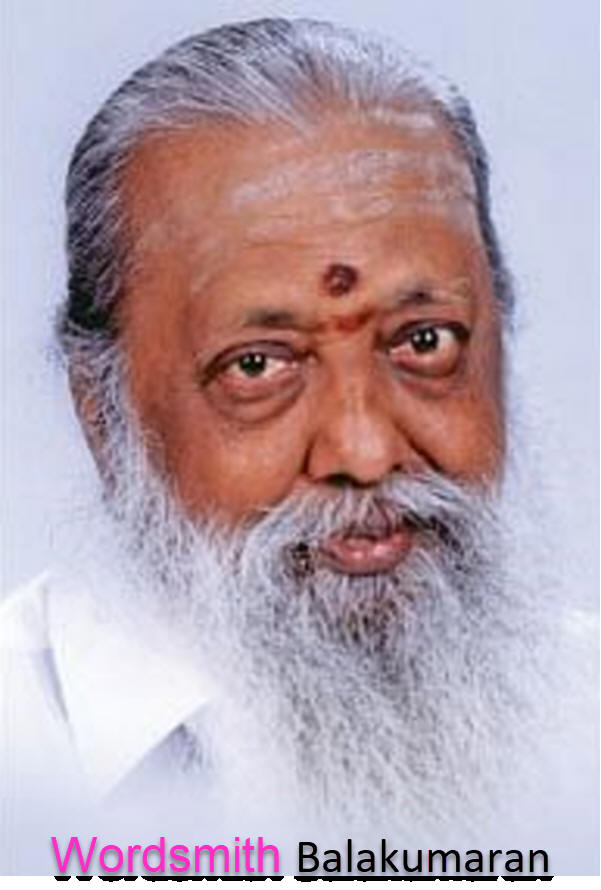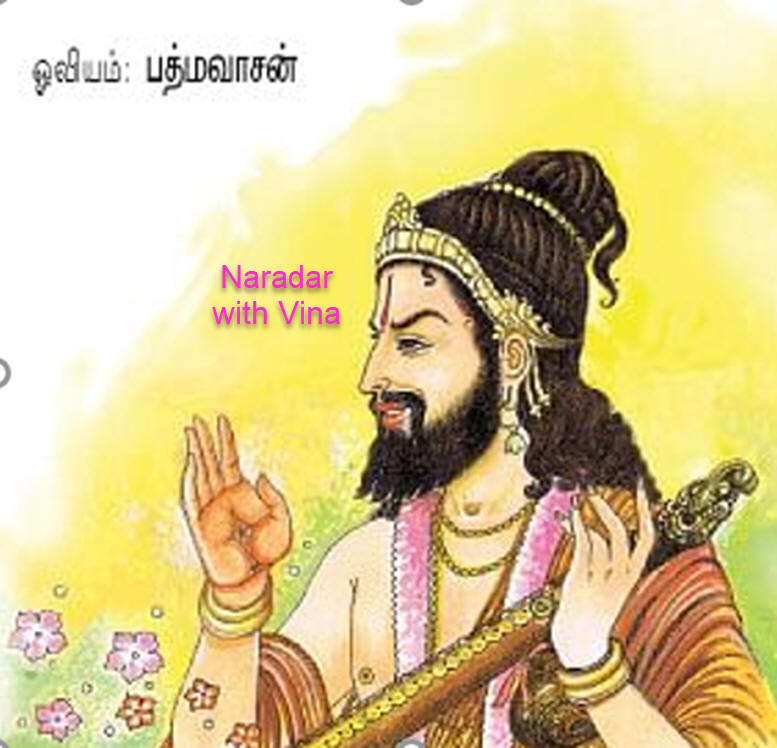Published:29 Apr 2013 8 PMUpdated:29 Apr 2013 8 PM Sakthi Vikatan
Vikatan Correspondent
Author: Wordsmith Balakumaran
Premium Story
1. That hot water lake bears the name Mānasa lake. On the lakeside, Naradar was playing on the lute. He was strolling on the lakeside, drawn by the mind influenced by an unknown force to pay attention to that locale.
2. The tranquil Mānasa lake at the base of the Himalayas was the habitat for the Devatās accustomed to taking a bath. The cold wind from the Himalayas swept by the lake. Though the sun was leaning to the north, attesting to a warm season, sunlight was not visible on the lakeside. The water bubbles rose at the left, the right, and in the front.

4. With love brimming from his heart, Naradar asked the youngster, "Ennappa! What is this? What are you doing ?" He looked under 10. He wondered why this youngster immersed himself in a big lake with a chill wind blowing. As the youngster rose from under the surface, many more youngsters of the same age and looks rose around him. Naradar, shocked and surprised, moved towards the waterline.
5. "Who are you? What are you doing here? Why are you going through this hardship under this inclement cold weather?" Nāradar's love and concern were showing. The youngster moved to the lakeside, opposed their palms, and prostrated at his feet.
6. The youngsters: We are doing Tapas.
Naradar: What Tapas.
7. The youngsters: It is the Tapas whereby we immerse in the lake, hold the air, slowly exhale the breath, and stop the breath.
Naradar: Who is the object of your Tapas?
8. The youngsters: The object of our Tapas is our grandfather, Brahma.
9. Naradar: If you are the grandchildren of Brahma, who is your father?
10. The youngsters: Dakṣa. All emitted that answer all at once.
11. Dakṣa's sons! That is why there is such brightness on the face. Such beauty! You must be the sons of the greatest Dakṣa to perform such Tapas at such a young age. All good and dandy. But why this Tapas.
12. The youngsters: Our father directed us to do it.
13. Naradar: What did he say to you?
14. The youngsters: You immerse in the water and direct your Tapas to Brahma.
15. Naradar: What purpose?
16. The youngsters: We must learn the profession of creation. We should obtain that as a boon.
17. Naradar: The work of creation! A thousand people. The world cannot bear now the weight of Brahma's creation. What will happen to the world, if you all do creative work? It will stop its rotation. Unable to bear the weight, the earth will choke. Why did your father tell you to do this big job?
18. The youngsters: Is it not that the creation work is imperative?
19. Yes
20. Is it not a unique work?
21. Yes
22. The youngsters: Our father asked us to learn the work of creation.

24. The youngsters were speechless.
25. The youngsters: We won't do it.
26. Naradar: What you do looks like it. With your creative work, what do you gain?
27. The youngsters: We will get respect because of the high position we attain. Is it not so?
28. Naradar: If a thousand individuals indulge in creation work, what is the earth's fate? Would you not have a competition among you? Would you not argue about whose creation is better, more elegant, and beautiful? Won't there be sibling rivalry? Will it not cause sorrow, shatter your togetherness, and cause split? Why this grief?
29. The youngsters: If so, what should we do now?
30. Naradar: You must pray to Śiva and seek him for liberation, Saranagati at his feet, the privilege of staying with him in Kailas as his Ganas or attendants, and freedom from rebirth. You could meditate on Śiva and become Śiva himself. Leaving all these benefits, why do you indulge in creation, add to the burden and destruction to the earth, and face breakup?
31. They thought for a while and said, "Yes." They paid homage to Naradar, entered the lake's waters, and immersed themselves with the supplication to Śiva that they should attain Śivaness and become Śiva's attendants. Dakṣa was heart-broken at the turn of events.
32. Though Dakṣa had mental distress, he consorted with the Daughter of the Mountain Vēdavalli and begot a thousand children. They were more powerful and more docile than their elder siblings. Dakṣa ordered them to direct their Tapas to Śiva and learn the art of creation.
33. They came to the Mānasa Lake to fulfill the parents' orders in compliance with the saying: There is no Mantra better than father's word. Nāradar came there. He clapped his hands and urged the Tapasvins to rise from under the surface of the water.

34. Nārada: What are you doing? Your brothers did this. What is the reason you do this?
35. Our father ordered us to do it.
36. To learn the work of creation.
37. Yes
38. To become Brahma.
39. Yes.
40. Referring to Brahma, this world has one too many. If you also indulge in creation, what would happen to the world? Why fight?
Who would do Tapas to this end? Would they go for a reward of an uncultivated pumpkin (that grew by happenstance), having plowed the land? Ask for a reward consistent with your endeavor. What you do is severe penance. The reward for a great penance is not a mere pumpkin. You supplicate, so you get Śiva Sorūpam, residence in Śiva Lokam and Jīvaṉ Mukti. Nārada thus explained the importance of liberation.
41. Nārada raised the question of wellbeing accrued from sitting in one place in tranquility with no connection to family or friends, bond, or purpose
42. The youngsters denied with a resounding no.
43. Nārada: To sit in a place with closed eyes and no purpose is the best of situations.
43. "Yes"
44. Nāradar said to them, "Ask Śiva for such a place. That is the best choice for you. The youngsters understood the advice of Nāradar, paid homage, immersed under the water, and supplicated to Śiva for the attainment of Mukti.
45. Dakṣa came to know of Nārada's role in changing his 2000 children's direction and boiled with anger.
46. Dakṣa leveled a curse at Nārada, saying. "You do not know a father's responsibility for begetting children and bringing them up to the highest position. You wander with no goal. You meander through life with no house, no wife, and no children. You blink pathetically everywhere. You have no permanent place of residence. You have no stability. You will lead a life of wanderlust. Let that be your life."
47. Nāradar, with a bowed head, accepted the curse. He thought it was better to suffer this hardship than to allow infliction of punishment on the earth because of creation. Nāradar considered Dakṣa's curse as a blessing in disguise. With no attachment to people and place, he gained the privilege of wandering to where his feet took him. That was his blessing. He rejoiced at the opportunity.
48. He paid homage to Bhagavan, saying, 'Nārāyaṇa, Nārāyaṇa.'
49. Nāradar explains the creation's absurdity in another episode.
Will continue.